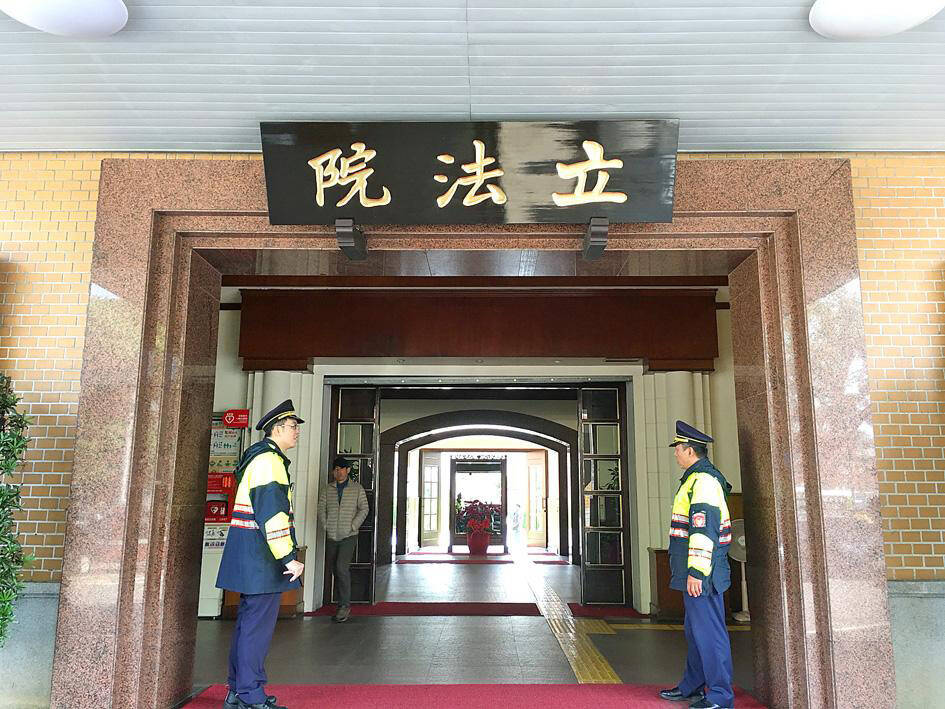Democratic Progressive Party (DPP) legislators have proposed an amendment to strip benefits from military retirees who have received suspended sentences for espionage-related offenses.
China frequently uses retired military officers to “build bridges” with active-duty military personnel in Taiwan, but under the law only those who have received sentences for contraventions stipulated in the Anti-infiltration Act (反滲透法) or the National Security Act (國家安全法) would lose their retirement benefits, DPP Legislator Puma Shen (沈伯洋) said.
The 14 retirees who have been sentenced for espionage-related offenses under those laws have been ordered to repay about NT$40 million (US$1.23 million) worth of benefits, but 85 percent of that remains outstanding, DPP Legislator Michelle Lin (林楚茵) said, adding that the convicted retirees could also avoid paying by applying for administrative relief.

Photo: Lin Liang-sheng, Taipei Times
Shen and Lin, along with DPP legislators Wu Li-hua (伍麗華), Lin Yi-chin (林宜瑾) and Tsai Yi-yu (蔡易餘), last week submitted a draft amendment for the Act of Military Service for Officers and Non-commissioned Officers of the Armed Forces (陸海空軍軍官士官服役條例) to the legislature’s Foreign Affairs and National Defense Committee.
The service regulations for officers and non-commissioned officers of the army, navy and air force stipulate that those who commit acts that facilitate civil strife or foreign invasion, or that endanger national security through the sharing of national secrets with a foreign power and are sentenced to fixed-term imprisonment, must lose their retirement benefits.
The proposed amendment adds that in cases where the prosecutor does not pursue a case or defers prosecution, or where a sentence has not yet been determined, the retiree would also lose their benefits.
Separately, Chinese Nationalist Party (KMT) lawmakers last week submitted proposed amendments to national defense-related laws to the committee for review.
KMT Legislator Hsu Chiao-hsin (徐巧芯) proposed amending Article 5 of the Pay Act of the Armed Forces (軍人待遇條例) to add a “combat bonus” for officers and soldiers serving in combat and combat support units to increase recruitment incentives.
Hsu also proposed amending the Armed Forces Punishment Act (陸海空軍懲罰法) to remove forms of corporal punishment, which she said had no educational benefit for soldiers and would deter recruitment.
KMT Legislator-at-large Weng Hsiao-ling (翁曉玲) proposed an amendment to Article 34 of the Military Trial Act (軍事審判法) to stipulate that cases of military personnel involving the Criminal Code be handled by military trial.
The law was amended following former army corporal Hung Chung-chiu’s (洪仲丘) death in 2013 to have cases handled by the civilian criminal court system, which led to criticism that it would harm military interests and national security.

‘CHARM OFFENSIVE’: Beijing has been sending senior Chinese officials to Okinawa as part of efforts to influence public opinion against the US, the ‘Telegraph’ reported Beijing is believed to be sowing divisions in Japan’s Okinawa Prefecture to better facilitate an invasion of Taiwan, British newspaper the Telegraph reported on Saturday. Less than 750km from Taiwan, Okinawa hosts nearly 30,000 US troops who would likely “play a pivotal role should Beijing order the invasion of Taiwan,” it wrote. To prevent US intervention in an invasion, China is carrying out a “silent invasion” of Okinawa by stoking the flames of discontent among locals toward the US presence in the prefecture, it said. Beijing is also allegedly funding separatists in the region, including Chosuke Yara, the head of the Ryukyu Independence

UNITED: The premier said Trump’s tariff comments provided a great opportunity for the private and public sectors to come together to maintain the nation’s chip advantage The government is considering ways to assist the nation’s semiconductor industry or hosting collaborative projects with the private sector after US President Donald Trump threatened to impose a 100 percent tariff on chips exported to the US, Premier Cho Jung-tai (卓榮泰) said yesterday. Trump on Monday told Republican members of the US Congress about plans to impose sweeping tariffs on semiconductors, steel, aluminum, copper and pharmaceuticals “in the very near future.” “It’s time for the United States to return to the system that made us richer and more powerful than ever before,” Trump said at the Republican Issues Conference in Miami, Florida. “They

GOLDEN OPPORTUNITY: Taiwan must capitalize on the shock waves DeepSeek has sent through US markets to show it is a tech partner of Washington, a researcher said China’s reported breakthrough in artificial intelligence (AI) would prompt the US to seek a stronger alliance with Taiwan and Japan to secure its technological superiority, a Taiwanese researcher said yesterday. The launch of low-cost AI model DeepSeek (深度求索) on Monday sent US tech stocks tumbling, with chipmaker Nvidia Corp losing 16 percent of its value and the NASDAQ falling 612.46 points, or 3.07 percent, to close at 19,341.84 points. On the same day, the Philadelphia Stock Exchange Semiconductor Sector index dropped 488.7 points, or 9.15 percent, to close at 4,853.24 points. The launch of the Chinese chatbot proves that a competitor can

‘VERY SHALLOW’: The center of Saturday’s quake in Tainan’s Dongshan District hit at a depth of 7.7km, while yesterday’s in Nansai was at a depth of 8.1km, the CWA said Two magnitude 5.7 earthquakes that struck on Saturday night and yesterday morning were aftershocks triggered by a magnitude 6.4 quake on Tuesday last week, a seismologist said, adding that the epicenters of the aftershocks are moving westward. Saturday and yesterday’s earthquakes occurred as people were preparing for the Lunar New Year holiday this week. As of 10am yesterday, the Central Weather Administration (CWA) recorded 110 aftershocks from last week’s main earthquake, including six magnitude 5 to 6 quakes and 32 magnitude 4 to 5 tremors. Seventy-one of the earthquakes were smaller than magnitude 4. Thirty-one of the aftershocks were felt nationwide, while 79